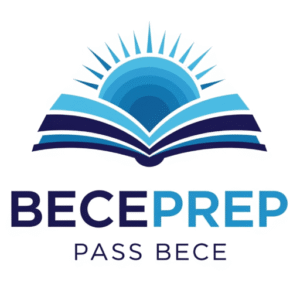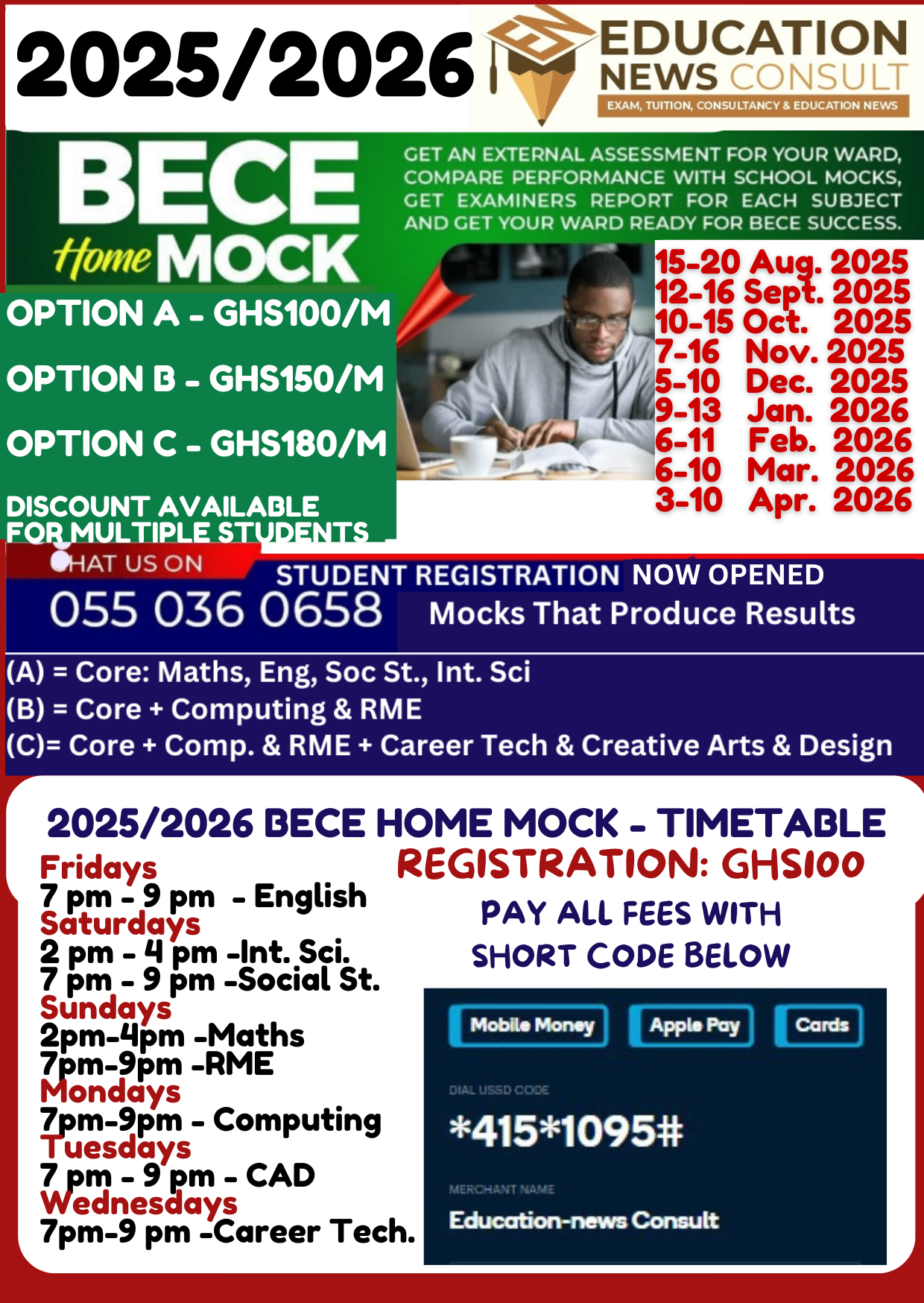This post contains a set of BECE Social Studies Test Questions, Answers and a Brief Explanation Why The Selected Correct Answer is the Best Alternative.
Parents can enrol their wards or candidates or learners preparing for the BECE by contacting us via 0550360658 for our BECE Home Mock Service.

BECE Social Studies Test – 1
1. Which of the following is Ghana’s highest court of law?
A. High Court
B. Supreme Court
C. Court of Appeal
D. Magistrate Court
Explanation: The Supreme Court is the highest court in Ghana, handling constitutional matters and final appeals. BECEPrep.com mock questions often include governance topics like this to help students prepare for real exam settings.
2. The main purpose of the 1992 Constitution of Ghana is to:
A. Increase government revenue
B. Promote tourism
C. Guide governance and protect citizens’ rights
D. Reduce inflation
Explanation: The constitution is the supreme law that governs the country, outlining citizens’ rights and state responsibilities. Students at BECEPrep.com learn to identify such foundational facts for quick recall in exams.
3. Which of these is a renewable natural resource?
A. Gold
B. Crude oil
C. Timber
D. Diamond
Explanation: Timber can be replenished if trees are replanted, making it renewable. At BECEPrep.com, environmental sustainability questions are frequently tested during mock practice.
4. The person who leads the Municipal Assembly is called the:
A. Member of Parliament
B. Assembly Member
C. Municipal Chief Executive
D. Presiding Member
Explanation: A Municipal Chief Executive (MCE) is appointed to head the Municipal Assembly and implement policies. BECEPrep.com mocks often challenge students to know the difference between political titles.
5. The Sahara Desert is found in which part of Africa?
A. Southern Africa
B. Central Africa
C. Northern Africa
D. Eastern Africa
Explanation: The Sahara, the largest hot desert in the world, is located in Northern Africa. Geography practice at BECEPrep.com ensures students remember such locations easily.
6. Which of these is an example of a civic responsibility?
A. Buying from the market
B. Voting in elections
C. Wearing traditional clothes
D. Watching the news
Explanation: Voting is a civic duty that allows citizens to choose their leaders. BECEPrep.com emphasises citizenship and governance in its mock exams.
7. Which river is the longest in Ghana?
A. River Pra
B. River Ankobra
C. River Volta
D. River Densu
Explanation: The Volta River is Ghana’s longest river, flowing through the Volta Lake. BECEPrep.com’s mock geography questions help students remember such key facts.
8. A country’s Gross Domestic Product (GDP) refers to:
A. The total money sent abroad
B. The total value of goods and services produced in a year
C. The total imports in a year
D. The total taxes collected
Explanation: GDP measures the value of all goods and services produced within a country in a given year. BECEPrep.com teaches economic concepts in simple terms for BECE candidates.
9. Which festival is celebrated by the people of Cape Coast?
A. Homowo
B. Fetu Afahye
C. Hogbetsotso
D. Aboakyir
Explanation: Fetu Afahye is an annual festival celebrated by the people of Cape Coast to mark the end of famine. BECEPrep.com mocks regularly test knowledge of Ghanaian festivals and cultures.
10. Which body is responsible for conducting the BECE in Ghana?
A. Ghana Education Service
B. Ministry of Education
C. West African Examinations Council (WAEC)
D. National Teaching Council
Explanation: WAEC conducts the BECE in Ghana. BECEPrep.com students often perform better because they are exposed to WAEC-style questions in advance.
11. Which of the following is the main occupation of people living along Ghana’s coast?
A. Farming
B. Mining
C. Fishing
D. Weaving
Explanation: Fishing is the dominant activity along coastal communities due to the availability of fish from the sea. BECEPrep.com’s geography section in mock exams trains candidates to link occupations with geographical locations.
12. The head of state in Ghana is the:
A. Chief Justice
B. Speaker of Parliament
C. President
D. Electoral Commissioner
Explanation: The President serves as both head of state and head of government in Ghana. BECEPrep.com governance topics prepare students for such straightforward but crucial questions.
13. The process by which citizens elect their leaders is called:
A. Campaigning
B. Selection
C. Voting
D. Nomination
Explanation: Voting is the act of choosing leaders during an election. At BECEPrep.com, mock civic education sessions often feature this concept.
14. Which mineral is mined at Obuasi?
A. Bauxite
B. Manganese
C. Gold
D. Diamond
Explanation: Obuasi in the Ashanti Region is famous for its gold mines. BECEPrep.com’s resource-based questions help students connect towns to their mineral resources.
15. The type of rainfall experienced in mountainous areas is:
A. Convectional rainfall
B. Cyclonic rainfall
C. Orographic rainfall
D. Relief drought
Explanation: Orographic rainfall occurs when moist air rises over mountains and cools to form rain. Students at BECEPrep.com learn to match rainfall types with geographical features.
16. Which of these is a correct way of managing solid waste?
A. Burning plastics in open areas
B. Throwing rubbish in rivers
C. Recycling plastics into new products
D. Dumping waste in open gutters
Explanation: Recycling converts waste into useful items and protects the environment. BECEPrep.com mocks always stress environmental conservation as a key exam theme.
17. Which of these is NOT a source of renewable energy?
A. Solar
B. Wind
C. Crude oil
D. Hydropower
Explanation: Crude oil is non-renewable because it cannot be replaced quickly after use. BECEPrep.com environmental science questions help students master this distinction.
18. The main reason for the formation of the ECOWAS is to:
A. Control migration in West Africa
B. Promote economic cooperation among member states
C. Organise football matches
D. Train soldiers
Explanation: ECOWAS (Economic Community of West African States) was established to encourage trade, unity, and development. BECEPrep.com covers ECOWAS extensively in regional integration topics.
19. The right to be heard in court is an example of:
A. Civic responsibility
B. Fundamental human right
C. Social service
D. Community law
Explanation: Fundamental human rights are freedoms every citizen is entitled to, including fair hearing in court. BECEPrep.com’s law and governance lessons equip students to spot such rights instantly.
20. The first president of Ghana was:
A. J.B. Danquah
B. Kofi Abrefa Busia
C. Dr. Kwame Nkrumah
D. Edward Akufo-Addo
Explanation: Dr. Kwame Nkrumah became Ghana’s first president in 1960 after independence. BECEPrep.com history questions ensure candidates remember such important leaders.
21. Which of these is a cause of rural-urban migration in Ghana?
A. Lack of internet in cities
B. Availability of farmland in villages
C. Search for jobs in cities
D. High rent in towns
Explanation: People often move to cities in search of better job opportunities. BECEPrep.com’s population studies questions help students understand migration trends.
22. The money used in Ghana is called:
A. Dollar
B. Pound
C. Cedi
D. Yen
Explanation: Ghana’s currency is the Cedi (₵). BECEPrep.com’s economics topics ensure students remember local financial facts.
23. Which of the following is NOT a social problem in Ghana?
A. Child labour
B. Armed robbery
C. Free education
D. Drug abuse
Explanation: Free education is a government policy, not a social problem. BECEPrep.com helps candidates differentiate between problems and solutions in society.
24. The leader of the United Nations is called the:
A. President-General
B. World Chairman
C. Secretary-General
D. Chief Ambassador
Explanation: The UN’s administrative head is known as the Secretary-General. BECEPrep.com’s international organisation questions often highlight this fact.
25. Which of the following is an advantage of saving money in the bank?
A. Money loses value
B. Money can be stolen easily
C. Money earns interest and is secure
D. Money becomes useless
Explanation: Banks keep money safe and often pay interest to savers. BECEPrep.com’s personal finance lessons teach the benefits of safe saving.
26. A place where historical objects are kept is called a:
A. Library
B. Gallery
C. Museum
D. Auditorium
Explanation: Museums store and display items of historical and cultural importance. BECEPrep.com cultural heritage questions prepare students for such simple but vital definitions.
27. The official residence of the President of Ghana is:
A. Christiansborg Castle
B. Jubilee House
C. Flagstaff House (old name)
D. Independence Arch
Explanation: The Jubilee House in Accra is the current official residence and office of Ghana’s president. BECEPrep.com mock current affairs updates keep candidates informed.
28. The term “democracy” means:
A. Rule by soldiers
B. Rule by the rich
C. Rule by the people
D. Rule by kings
Explanation: Democracy is a system where citizens have the power to elect leaders. BECEPrep.com governance topics help students recall such core definitions.
29. Which body is responsible for collecting taxes in Ghana?
A. Ministry of Finance
B. Ghana Education Service
C. Ghana Revenue Authority
D. Bank of Ghana
Explanation: The Ghana Revenue Authority (GRA) collects taxes and ensures compliance with tax laws. BECEPrep.com mocks on economics often test this institution.
30. Which of these is a traditional authority in Ghana?
A. District Chief Executive
B. Member of Parliament
C. Chief
D. Police Commander
Explanation: Chiefs are traditional leaders who oversee customary laws and culture. BECEPrep.com cultural governance questions highlight their roles.
31. Which of these is an example of a natural disaster?
A. Road accident
B. Earthquake
C. Fire outbreak from faulty wiring
D. Building collapse due to poor materials
Explanation: Earthquakes are caused by natural movements of the Earth’s crust. BECEPrep.com environmental studies topics prepare students to spot such distinctions.
32. The study of the Earth’s surface and physical features is called:
A. Economics
B. Sociology
C. Geography
D. History
Explanation: Geography examines the Earth’s features, climates, and human interactions with them. BECEPrep.com mocks train students to link terms to their definitions.
33. Which of these helps to reduce unemployment in Ghana?
A. Closing down factories
B. Increasing taxes on businesses
C. Encouraging entrepreneurship
D. Banning vocational schools
Explanation: Entrepreneurship creates jobs and boosts the economy. BECEPrep.com’s economics section encourages candidates to think about practical solutions.
34. The main cash crop produced in Ghana is:
A. Coffee
B. Cotton
C. Cocoa
D. Rice
Explanation: Cocoa is Ghana’s top cash crop and a major export earner. BECEPrep.com agricultural economics questions often feature this fact.
35. Which of the following is NOT an effect of deforestation?
A. Soil erosion
B. Loss of wildlife habitat
C. Increase in forest cover
D. Reduction in rainfall
Explanation: Deforestation decreases forest cover, not increase it. BECEPrep.com environmental questions train students to spot such contradictions.
36. Which of these is an informal sector activity?
A. Banking
B. Teaching in a public school
C. Street hawking
D. Working in a hospital
Explanation: Informal sector jobs are unregulated by government and include street hawking. BECEPrep.com economics topics ensure students know sector differences.
37. Which of these promotes national unity?
A. Tribal discrimination
B. Inter-ethnic marriages
C. Political violence
D. Regional favouritism
Explanation: Inter-ethnic marriages bridge cultural gaps and encourage unity. BECEPrep.com’s social harmony lessons emphasise such solutions.
38. The main reason for forming co-operatives is to:
A. Fight government policies
B. Make people lazy
C. Pool resources for mutual benefit
D. Discourage savings
Explanation: Co-operatives allow members to work together to improve welfare and income. BECEPrep.com mocks in business studies highlight their importance.
39. Which of these is an effect of population growth?
A. Increase in employment opportunities
B. Pressure on social amenities
C. Abundance of resources
D. Reduction in waste production
Explanation: Rapid population growth can strain water, health, and education facilities. BECEPrep.com population studies questions make students think critically about causes and effects.
40. Which of these is an element of culture?
A. Electricity
B. Factory machines
C. Language
D. Satellite
Explanation: Language is part of non-material culture and plays a key role in identity. BECEPrep.com culture topics prepare students to identify both material and non-material cultural elements.
